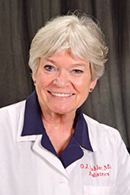Caregivers of Children with Cancer See Benefits from Bright IDEAS: Problem-Solving Skills Training
 Olle Jane ("OJ") Sahler, M.D., Professor of Pediatrics, Psychiatry, Medical Humanities, and Oncology, is working to bring problem-solving skills training (PSST) to about 200 pediatric psycho-oncology providers throughout the US and Canada with the help of a newly awarded $1.4 million R25 education grant from the National Cancer Institute. The providers will work with parents or other caregivers of children with cancer. The caregivers will be taught strategies to solve problems and manage adverse situations to decrease perceived distress and increase coping skills and well-being.
Olle Jane ("OJ") Sahler, M.D., Professor of Pediatrics, Psychiatry, Medical Humanities, and Oncology, is working to bring problem-solving skills training (PSST) to about 200 pediatric psycho-oncology providers throughout the US and Canada with the help of a newly awarded $1.4 million R25 education grant from the National Cancer Institute. The providers will work with parents or other caregivers of children with cancer. The caregivers will be taught strategies to solve problems and manage adverse situations to decrease perceived distress and increase coping skills and well-being.
Dr. Sahler’s version of PSST intervention is referred to as Bright IDEAS. Bright for the sense of optimism that is essential to overcoming adverse life events and the five steps of problem solving:
- Identify the problem,
- Define your options,
- Evaluate your options,
- Act, and
- See if it worked.
The intervention was developed specifically to help caregivers face the demands and stresses of medical care for children with cancer while still managing the family’s ongoing daily needs. The Bright IDEAS project was first funded in 1995 and has been tested in almost 1000 mothers and other caregivers of recently diagnosed childhood cancer patients. The training has been found to be highly effective in improving mood, anxiety, and post-traumatic stress as long as three months after the intervention has been completed. Dr. Sahler also has preliminary data that the intervention can be applied to problems encountered across many illness types, most recently in a study of mothers of children with autism spectrum disorder. Bright IDEAS was designated as a research-tested intervention program (RTIP) by the NCI in 2010 and is included in electronic print format on the RTIP website for worldwide distribution.
Dr. Sahler and her collaborators at the University of Colorado Denver, Children’s Hospital Los Angeles, St. Jude Children’s Research Hospital, Children’s Hospital of Pittsburgh, and the UT/MD Anderson Cancer Center are currently developing an online version of Bright IDEAS that would be available 24/7 via any computer, tablet, or phone with Internet access.
To increase the reach of Bright IDEAS and make its benefits more widely known, the newly awarded R25 grant will allow Dr. Sahler and her colleagues to train 200 psycho-oncology care providers, such as advanced practice nurses, social workers, and psychologists working with families at child cancer centers in North America. Ten training workshops will be held over four years in conjunction with meetings of the Children’s Oncology Group (COG), the Association of Pediatric Hematology/Oncology Nurses (APHON), the Association of Pediatric Oncology Social Workers (APOSW), and the Society of Pediatric Psychology (SPP). Twenty of the 200 pediatric psycho-oncology providers will be selected to become Bright IDEAS “train-the-trainers” to help reach an even broader audience. Dr. Sahler’s co-PI on this project is Robert Noll, Ph.D. at the Children’s Hospital of Pittsburgh.